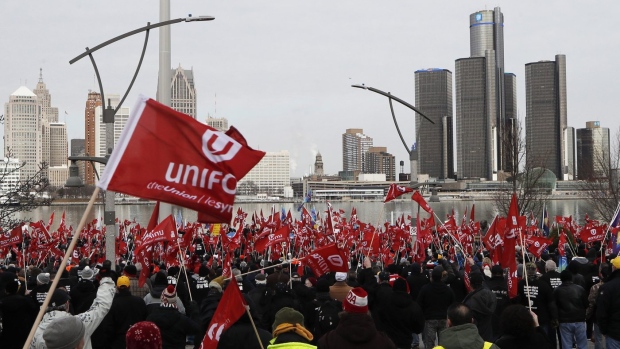Unifor BIG Three autoworkers vote for strike mandate, mirrors U.S. counterpart
, The Canadian Press
Aug 28, 2023

Canadian and U.S. autoworkers are both negotiating with the Detroit Three carmakers simultaneously for the first time in 25 years, creating the potential for a co-ordinated strike against one of the major producers.
Workers at the Canadian arms of Ford, General Motors and Stellantis this past weekend voted between 98 per cent and 99 per cent in favour of allowing Unifor to call a strike if bargaining committees fail to secure the collective agreements.
York University associate professor Steven Tufts says the strong strike mandate signals that the workers may not be happy with the current offers and are willing to strike and make gains.
"They do have a mandate that strong," he said of the union representing 18,000 autoworkers.
"(The workers) may push the employer a little bit harder, not only to expand the investments but also to secure wage gains that a lot of workers want now, especially in a period of high inflation and higher interest rates."
effort to improve pensions, increase wages, and secure good, union jobs in the EV future
Along with a wage boost and commitments for electric vehicle production, Unifor wants to improve workers' pensions. When automakers were on the brink of bankruptcy during the financial crisis of 2008-09, employees made significant pension concessions, including a shift toward defined contributions. Payne has said Unifor will be fighting to restore some of what was lost.
Detroit Three workers' contracts, for Unifor in Canada and United Auto Workers south of the border, are set to expire days apart in September making it an interesting time for bargaining.
Tuft said while Unifor and UAW are bargaining at the same time, both unions have separate goals for their workers.
He said the Canadian Auto Workers are looking to secure and expand investment, with a focus on the transition to electric vehicle-related production.
"We've been focused in recent years on securing investment because the footprint in Canada was shrinking," he explained.
He added that getting investments in electric vehicle manufacturing would secure jobs in Canada for years to come.
Daniel Ross, senior manager of automotive industry insights at Canadian Black Book, said the deal could be foundational for Canada's electric vehicle industry.
"(This) could make us a definitive new car production powerhouse for the next generation of vehicles," he said. "We need to have that foundation built down."
The U.S. auto counterparts are focused on securing higher cumulative wages, pushing for a 40 per cent hike, which Tuft says is an attempt to make up for the lost territory in wages over the years.
Members of the United Auto Workers union also handed down a strike mandate with 97 per cent of members in favour.
Tuft said the strong mandate for strikes on both sides of the border could possibly lead to a continental shutdown of the auto sector if Unifor and UAW go out days or weeks apart.
Unifor is expected to announce their target company after the Labour Day weekend.
The union usually picks one automaker with which to concentrate bargaining. Whatever terms are agreed to with that target company general carry over to the other two.
Unifor will likely focus on Ford Motor Co. over General Motors or Stellantis as the lead automaker during this round of three-year contract talks, Unifor leader Lana Payne has said. Ford is most advanced and forthcoming on its electric vehicle transition plans and other negotiations, she said, but the union hasn't announced a final decision.
Tuft said if the unions on both sides pick the same auto company, despite having different priorities, they could have a greater affect bargaining.
A potential strike could add to the COVID-19-induced supply chain issues that the industry is still recovering from.
Ross said if the union and employers fail to come to agreeable terms, it would affect the production of new vehicles, further dampening the automotive industry.
"As we know, the scenario is not perfect," he said. "This is just going to be an insult to injury."
